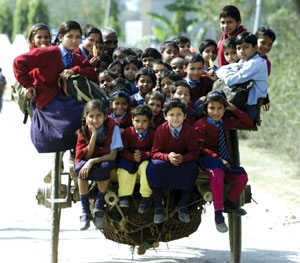 |
As the global population surpassed 7 billion people this week, addressing the challenges associated with a still-growing world population will require a two-pronged response, according to experts with the Worldwatch Institute.
The combined measures of empowering women to make their own decisions about childbearing, and significantly reducing global consumption of energy and resources would move humanity towards environmentally sustainable societies that meet human needs.
Roughly 4.5 billion people have been added to the world population in just the last 60 years, according to UN estimates, putting increased strain on the world's ecosystems and resources. Because humans interact with their surroundings far more intensely than any other species, it is accelerating climate change and driving species to extinction.
To some extent, these outcomes are now unavoidable, says the Worldwatch Institute; we'll have to adapt to them. But in order to improve the likelihood that they will not be catastrophic, governments need to reduce population growth and address the environmental and social impacts that continued population growth will have.
"It is precisely because the human population is so large and is growing so fast that we must care how much we, as individuals and nations, are increasingly out of sync with environmental sustainability," said Worldwatch President Robert Engelman, an expert on global population. "The challenge becomes even more with each generation.
Fortunately there are ways to practically and humanely slow population growth and reduce the impacts associated with the growth that occurs."
Earlier this year, the United Nations Population Fund (UNFPA) launched '7 Billion Actions', a campaign to highlight positive actions by individuals and organisations addressing global development challenges.
"Addressing global population growth is not the same thing as controlling population," Engelman said. "The most direct and immediate way to lower birth rates is by assuring that women can make their own choices about whether and when to bear a child."
He said that the world's energy, water, and materials consumption must also be controlled through greater use of conservation, efficiency, and green technologies. He recommends two solutions:
l Empower women to make their own decisions about childbearing
l Consume fewer resources and waste less food
Humans appropriate anywhere from 24 per cent to nearly 40 per cent of the photosynthetic output of the planet for food and other purposes, and more than half of the planet's accessible renewable freshwater runoff. In addition to overuse of finite resources, humans waste large quantities of food every year.
Industrialised countries waste 222 million tons of food annually. If fewer resources and less food were wasted, the world would be able to feed more people and use fewer resources. With nearly 1 billon hungry people worldwide, wasting less food would also mean utilising existing resources, not new ones, to feed them.


